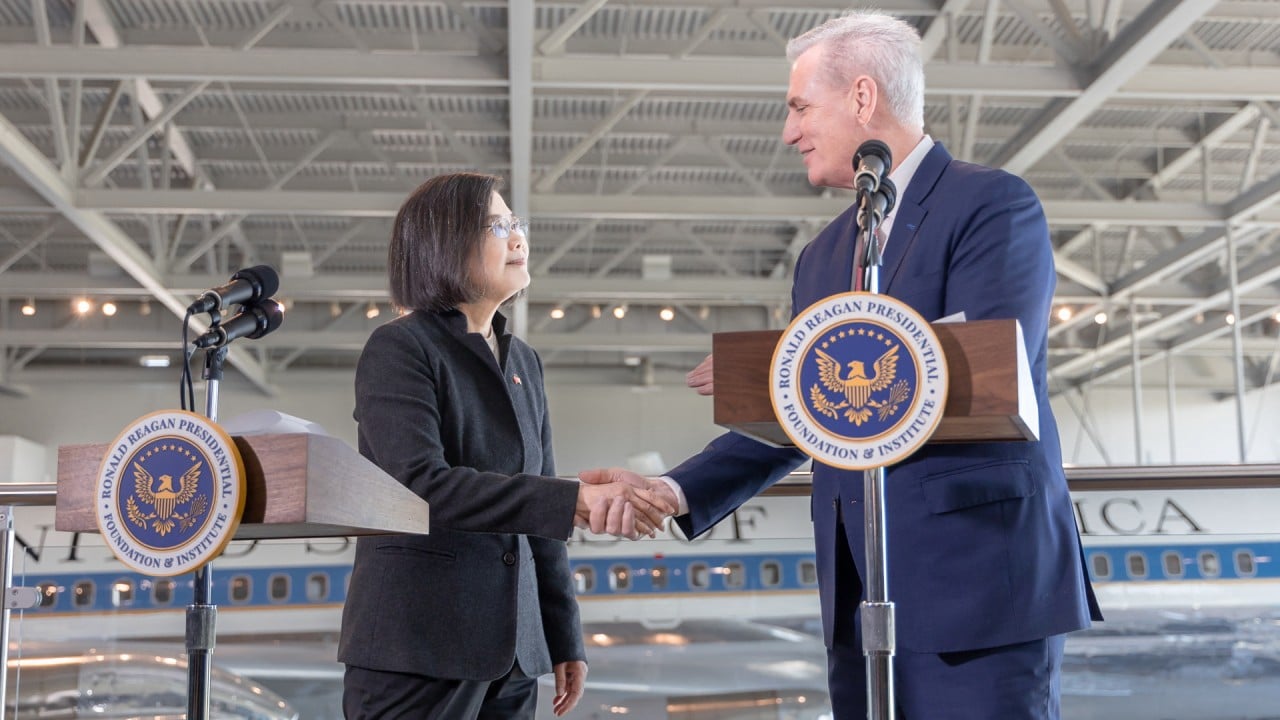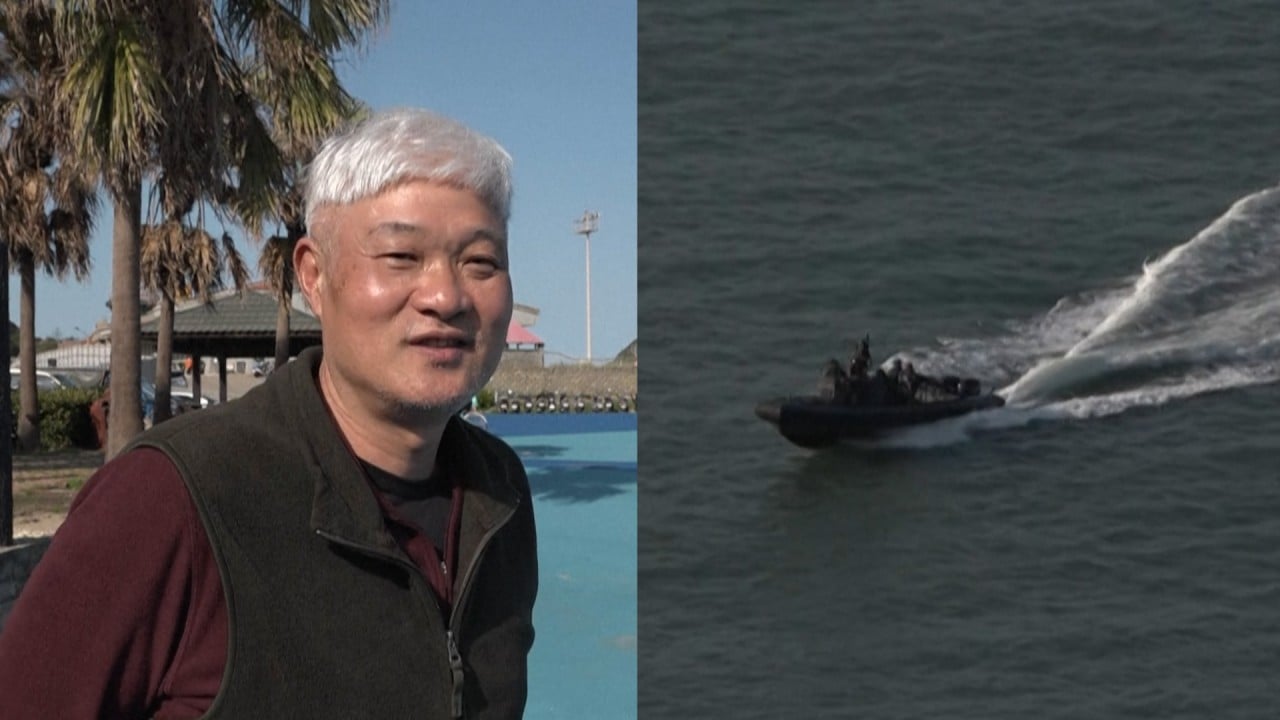
Could Taiwan’s ‘white’ knight Ko Wen-je smash through the island’s blue-green split?
- Polls put the former Taipei mayor, who is especially popular with young people, just a few points behind his rivals from the main parties
- He has tried to position himself as straddling the divide between the independence-leaning green camp and the mainland-friendly blue side
The head of the Taiwan People’s Party once said he would have zero chance of winning, but analysts now believe he is capable of mounting a genuine challenge to the candidates from the two biggest parties.
But Ko, who stepped down as mayor of Taipei last year, has now confirmed his entry into the high-stakes contest, which will be held amid growing tensions with Beijing, which it regards as a breakaway province and has not renounced the use of force to bring it under its control.
He has steadily polled at around 20 per cent in various local opinion polls and is popular among young voters.
“Ko most likely will become the biggest variable in the 2024 presidential election,” said Wang Shih-chien, a Taipei city councillor from the DPP and constant critic of Ko’s during his eight-year term as mayor.
“He is a frightening force because he is capable of catching the attention of others,” Wang said, referring to the former mayor’s habit of making surpising but thought-provoking comments.
Wang said the recent rise in Ko’s support was understandable because he recently wrapped up a three-week tour of the United States.
Taiwanese presidential candidates traditionally go to the United States before elections to brief American officials, business leaders and academics on their policies should they win office. Washington is Taipei’s biggest backer, and although it does not officially recognise it as independent, it is legally bound to help it defend itself from military attack.
Ko said he had spent six days in Washington during his visit to the US,“having close and thorough exchanges” of views with politicians, including the Republican former secretary of state Mike Pompeo and Democrat congressmen.
“Through mutual trust and sincere dialogues … I have a clearer picture of the prospects and challenges Taiwan is facing and I will continue to carry on with my pragmatic approach to win recognition from voters,” he wrote in a Facebook post on April 27.
He said he would do all he could to reduce the long-time “political divide and ideological differences” on the island and to strive for the “internationalisation and normalisation of Taiwan”.
US-Taiwan trade negotiations should be updated ‘soon’, Biden official says
The former doctor started as an informal ally of the DPP when he ran as an independent for mayor in 2014, but part of his campaign platform focused on ending the political divide in Taiwan.
“If elected, I won’t join any political party,” he said in a campaign debate during the 2014 Taipei mayoral race.
He argued that Taiwan’s biggest problem was the nonstop political fight between the independence-leaning “green” and mainland-friendly “blue” camps and such ideological confrontation was disadvantageous to the long-term development of the island.
After he was elected mayor, Ko gradually distanced himself from the DPP but managed to win his second four-year term in 2018 through the support of voters who dislike the ideological struggles between the KMT and the DPP.
Based on such support, he founded the Taiwan People’s Party a year later as a “white force” that stands between the green and blue sides.
Taiwan welcomes renewed US, Philippines commitment to regional security
As mayor he jointly organised an annual twin-city forum with the Shanghai authorities and visited the Chinese mainland 18 times as mayor.
He also repeatedly called for the resumption of cross-strait dialogue to reduce the risk of war across the Taiwan Strait.
Since then he has said he accepts the two sides of the Taiwan Strait are one family, echoing Beijing’s preferred rhetoric and bringing him closer to the KMT’s position.
Beijing has suspended official exchanges with Taipei since Tsai Ing-wen of the DPP was elected president in 2016 and refused to accept the consensus.
Ko’s position is that the consensus now only causes resentment among the Taiwanese people and the mainland authorities should find another formula that the public can accept to restart cross-strait dialogue.
Tsai Pi-ru, a former Taiwan People’s Party lawmaker and adviser to Ko, said if the 63-year-old can keep his support rate above 20 per cent in coming months, he would be a genuine threat to both the DPP and KMT.
“Until now, the KMT has yet to clearly decide who will run for the party, and its most popular choice Hou Yu-ih is tipped to be challenged by other KMT aspirants, including [Foxconn’s billionaire founder] Terry Gou over his inexperience in cross-strait and foreign policy,” Tsai said.
Tsai said Hou’s previous comment that Taiwan should not become a “superpower’s pawn” has been used by the DPP and pro-independence camp to attack him for taking a “US-sceptical” stand that might upset Washington, the island’s main international backer.
She added that although Lai has been confirmed as the DPP’s candidate, his comments as premier in 2018 that he would be a “pragmatic worker for independence” may worry the Americans.

“All these problems could allow Ko to have room for manoeuvre to increase his chances in the race, given that the TPP leader is popular among young and neutral voters,” Tsai added.
A March survey by National Chengchi University’s Election Study Centre in Taipei showed that Ko was the most popular politician among young people with a popularity rating of 5.9 out of 10, followed by Hou’s 5.36 points and Lai’s 4.91 points.
His opinion poll rating has remained steady this year and two recent polls have suggested he is within a few points of catching his rivals.
In an April 19 survey by Taiwan Public Opinion Foundation he polled at 22.6 per cent compared with 33.4 for Lai and 29.7 per cent for Hou. In a poll last Tuesday by the Taipei-based United Daily News, Ko was on 23 per cent, compared with 29 per cent for Hou and 27 per cent for Lai.
Who will win Taiwan’s crucial 2024 election?
Under the Taiwanese election system, there is no run-off in the presidential vote and the candidate with the most votes will be the outright winner.
“Ko should be able to absorb votes from both the KMT and the DPP, especially young voters who do not like the two parties,” said Wu Tzu-chia, head of online media platform My-Formsa.com.
Wu said the DPP’s policy of extending the mandatory military service of the island’s conscripts from four months to one year and its attempt to turn the 2024 poll into a “choice between war and peace” – a reference to its usual tactic of portraying a KMT victory as spelling doom for Taiwan – has scared away some young voters.
Chan Wei-yuan, a KMT Taipei city councillor, said those who support Ko are disappointed with the performances of both the KMT and the DPP, which would make the third party candidate a spoiler in the race.

Although Ko and his party have positioned themselves as neither blue nor green in an attempt to appeal to people across the divide, Chan suggested he may be a bigger threat to the KMT by splitting the blue vote.
“But as long as the KMT candidate is able to maintain a strong lead ahead of Ko, a split vote within the blue camp could be averted due to the strategic voting effect when voters automatically move their support from their first preferred candidate to another one who has a better chance at winning,” Chan said.



